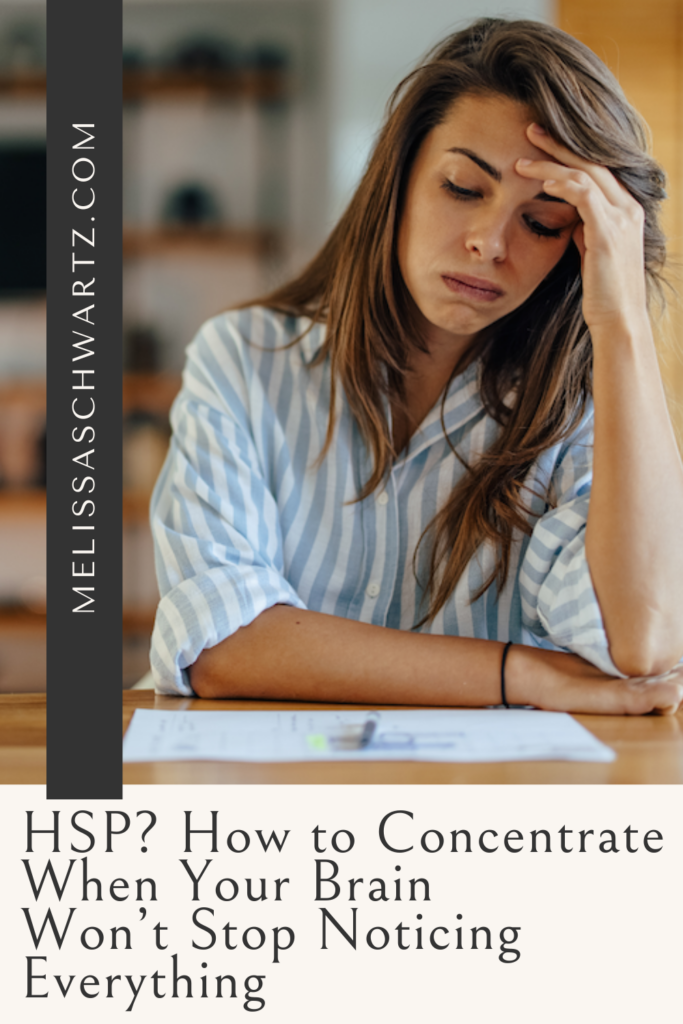You sit down to focus, and suddenly you’re aware of everything. The sound of your neighbor’s lawnmower. The way your shirt seam feels against your skin. The email you forgot to respond to. Your dog’s shifting energy. A subtle smell from the kitchen. It’s like your mind has fifty tabs open, and every single one is buzzing. If this sounds familiar, you’re likely a Highly Sensitive Person (HSP). And if you’ve ever wondered why focusing is so hard, the answer lies in your nervous system. Discover practical, empowering strategies for HSP how to concentrate by working with your sensitivity, not against it.

Why HSPs Struggle to Concentrate
Highly sensitive people have a trait known as sensory processing sensitivity, which means we deeply process external stimuli, notice subtleties that others miss, and have nervous systems that are easily overwhelmed by too much input. This is not a flaw, it’s a feature. But it does make it hard to concentrate in environments filled with noise, distraction, or emotional intensity.
As HSPs, we don’t just see and hear, we deeply experience the world, often absorbing the emotions, moods, and energies around us. This can lead to sensory overload and stress, leaving us mentally foggy, emotionally frazzled, and unable to focus on a single task without feeling like we’re climbing uphill.
Concentration requires calm, regulated nervous systems, something that can be elusive when you’re constantly filtering the world through a sensitive lens.
You’re Not Broken. You’re Just Wired Differently
First, let’s clear this up: Struggling to concentrate does not mean you’re lazy, distracted, or undisciplined. It means your nervous system is taking in more information than the average person, and it needs a different kind of support.
One of my favorite HSP advocates, Julie Bjelland, often speaks about how overstimulation affects HSPs and how we need tools to regulate, soothe, and protect our energy. This is absolutely key. We’re not here to “fix” you, we’re here to help you work with your sensitivity rather than against it.
8 HSP-Friendly Strategies to Improve Concentration
Whether you’re working, studying, parenting, or just trying to get through your to-do list, these tools can help you concentrate without draining your energy or fighting your nature.
1. Create a Sensory-Safe Environment
A chaotic space leads to a chaotic mind, especially for HSPs. Take time to design a work or study space that feels calming and supportive. Think:
- Soft lighting instead of harsh overheads
- Noise-canceling headphones or white noise
- Neutral colors and minimal visual clutter
- Comfortable clothing that doesn’t distract
Minimizing external stimuli reduces the amount of processing your brain has to do, freeing up space for focus.
2. Do a Sensory Check-In
Before starting a task, pause and ask:
- Is there anything physically irritating me right now (itchy clothes, room temperature, background noise)?
- Do I feel safe and grounded?
- Am I holding any tension or negative emotions from earlier?
By naming what’s happening in your body and environment, you can take steps to create a container for focus instead of distraction.
3. Practice Self-Care Before Focused Work
Practicing mindfulness and intentional self-care is essential, not just for wellness, but for concentration. A dysregulated, overstimulated nervous system can’t focus. That might look like:
- Doing breathwork for two minutes before you start
- Taking a walk to release pent-up energy
- Drinking tea while journaling for five minutes
You are more likely to focus when your nervous system feels safe and grounded.
4. Honor Your Natural Rhythm
HSPs often feel more clear-headed and focused at certain times of day. Track your energy over the course of a week and notice when you feel most productive. Are you a morning person or do you hit your stride in the afternoon?
Don’t force productivity during times when your system feels off. Instead, try finding balance between rest and effort, honoring your energy cycles rather than forcing your brain into action mode.

5. Set Clear Boundaries with Distraction
Setting boundaries isn’t just for relationships, it applies to your time, energy, and tech, too.
- Put your phone on airplane mode or in another room
- Turn off desktop notifications
- Close browser tabs unrelated to your current task
These small but intentional actions can prevent your attention from being hijacked and help you stay in flow.
6. Use Timers to Create Mental Containers
The HSP brain thrives on structure. Try working in “focus blocks” using a timer, 25 minutes on, 5 minutes off. During the focused block, do only one task. Nothing else.
This method (often called the Pomodoro Technique) creates safety and predictability for the brain, making it easier to maintain attention without feeling trapped or overwhelmed.
7. Watch for Sensory Overload
Many HSPs don’t realize that their inability to focus is actually a symptom of sensory overload and stress. If your environment is loud, bright, or emotionally tense, or if you’ve had no downtime, your brain may be operating in fight-or-flight mode.
Signs of overload include:
- Brain fog
- Snapping at others
- A sudden desire to zone out or nap
- Feeling anxious or emotionally raw
When these signs show up, it’s a cue to pause. Step outside, close your eyes, or move your body. Reset your nervous system before asking it to focus again.
8. Offer Yourself Grace
If you start to feel overwhelmed, try this gentle reframe:
“My brain is noticing a lot because it cares deeply. That’s okay. I’m going to breathe, regroup, and try again.”
Highly sensitive people are deep processors. You’re not meant to function like a machine. You’re built for empathy, creativity, intuition, and insight. That’s powerful. But it also means your brain sometimes needs a different pace.
Concentration Is a Mental Health Practice for HSPs
For HSPs, learning to concentrate is deeply connected to mental health. It’s not about “getting more done”—it’s about listening to your body, respecting your nervous system, and structuring your life in a way that honors your sensitivity.
When we stop comparing ourselves to non-HSPs and instead build routines and rhythms that support who we actually are, everything changes. We go from burnout to balance. From distracted to present. From stressed to aligned.
Your Sensitivity is a Gift
So if you’ve ever felt frustrated or ashamed about your inability to concentrate, I want you to know: you’re not failing. You’re sensitive. And that’s a gift.
By practicing mindfulness, protecting your energy, and tuning into your environment, you can train your brain to focus, without compromising your emotional well-being. It’s not about powering through. It’s about finding what supports you.
You can concentrate. You just need the right conditions to do it.
And if you’re ready to dive even deeper into your beautiful sensitivity, I’d love to invite you to my FREE 5-day course, Tender Hearted.
Tender Hearted is my brand-new offering, a completely free, gentle series designed to help you discover, understand, and fall in love with your unique sensitivity. Over five days, we’ll walk through what it really means to be highly sensitive (no, you’re not too emotional), how sensory processing sensitivity shapes your experience, and how to better manage your nervous system so you feel empowered, not overwhelmed.
By the end, you’ll have more appreciation for your innate wiring and the unique way you experience the world. You’ll understand that sensitivity is not a weakness, it’s a strength. And you’ll begin to recognize and connect with others who are part of this incredible “Highly Sensitive Club.”
Join me for this delightful journey. I promise, your tender heart will thank you. Learn more here.
If you enjoyed this article, HSP? How to Concentrate When Your Brain Won’t Stop Noticing Everything, you might also enjoy:
- HSP and Autism: 7 Key Differences and Overlaps to Understand
- 10 Transformative Empath Books Every Sensitive Person Should Read
- Clairsentient vs Empath: What’s the Difference and How to Tell Which You Are
Pin-it for later: HSP? How to Concentrate When Your Brain Won’t Stop Noticing Everything


